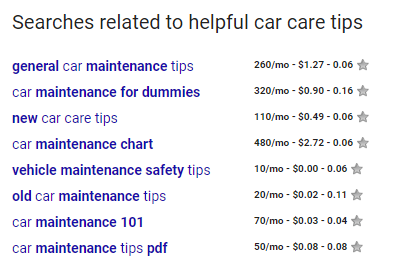The best advice is to write what you know. Gathering information from other sources is acceptable when you organize it in your own words (more on that later). But, the best articles are written from your own personal experience and knowledge that tell a story or provide valuable information and assistance to your audience.
To best rank in Google, the practice of Search Engine Optimization (SEO) shows that your website is an authority in your sphere. Google’s little crawling bots are supercharged with artificial intelligence and now have the ability to “read” your content on each page of your site. From that, the algorithms determine if you are providing the information your customer needs and expects from a particular page or post. You’ve probably heard the phrase “Content is King!” if you’ve been looking into SEO lately. Here’s a quick tip – comb through your content on your web pages and do a little spring cleaning. Then start writing!
Optimizing Pages
As you create content, remember to optimize your blog article for a specific keyword phrase. I like to use the free version of the Yoast plugin. It helps with everything from readability to metatags to setting an image for any Facebook post that links to your article. Yoast does this for all pages—blog or otherwise.
Choosing Topics
Brainstorm
Whether you own a business or run an organization or non-profit, people are asking you things on a regular basis. This is a great place to start! What questions are you and your staff asked most frequently? Each one could be the topic for an article.
Research
Based on your industry, you can search for blog ideas online. The key is finding what 1) you have extensive knowledge about and 2) your audience wants to know. Type “blog idea articles for…. (auto repair)” into Google, and sift through the articles. Or, search a topic, and scroll to the bottom of the page to see related searches:

Being Dynamic
Mix up the type of articles you write. Categories to consider include:
- Personal Stories and Testimonials
- Informational/Factual
- Causes – Calls to Action or Giving
- Current Events & Issues
- Expert Advice in your industry
- Cheat Sheets or Infographics
- & just plain Entertainment
You can even do a video blog (vlog) and embed the video into your web page to provide variety and interest.
Crafting Catchy Titles
Using your knowledge and expertise, be creative in giving your article an eye-catching title (incorporating the keyword phrase if possible). For example, your article can be titled “Top 10 ways to…” “5 Ways to create a… “ “8 Simple Tips for…” Brainstorm with your team and think outside the box.
I like to read several articles on a specific topic before forming my own words to share similar information. It is also vital to add my own experience, knowledge, and opinions.
Cuidado! (Watch Out):
- Plagiarism is content theft. Use the tips in this article such as reading more than one source, using your own words, and making sure you cite your resources properly. Here’s a great resource for you: Free Plagiarism Checker Websites
- Know your audience when tackling controversial or sensitive topics, and adjust accordingly. Depending on your industry and role, you will often need to leave your personal soapbox at home and keep a very professional tone in your writing.
- Grammar, Spelling, Punctuation, and Readability – This really should be at the top of the list. If you struggle with any one of these—most people do—then use a spelling and grammar checking tool. MS Word has a free spelling/grammar check built in, but you can go one step further and use another grammar checker.
Let’s wrap it up. (This signifies the summary or ending paragraph. Creating a great blog post also means paying attention to the basics of writing such as ensuring you include a clear beginning, a middle, and an end.)
Our top tips are to write what you know; provide meaningful and helpful content to your audience; remember that variety is the spice of blogs; and be careful what you say, who you borrowed it from, and how you say it!

